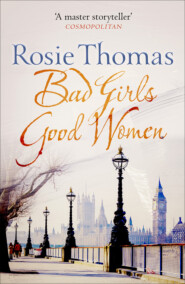По всем вопросам обращайтесь на: info@litportal.ru
(©) 2003-2025.
✖
Rosie Thomas 3-Book Collection: Moon Island, Sunrise, Follies
Автор
Год написания книги
2019
Настройки чтения
Размер шрифта
Высота строк
Поля
Alexander sighed and closed his paintbox. ‘I’m going to make lunch, Elizabeth. Fish soup, I think.’
‘Good,’ Elizabeth said. Alexander was an excellent cook.
The fog had thinned enough for a game of tennis to be just feasible. Beyond the netting of the court the rear of the Beams’ house was still no more than a dark, formless mass, but the players were visible to each other as they paced on the back line for the knock-up.
When the game began John Duhane was partnering Marty Stiegel against Tom and Joel Beam. John was an adequate player but he was out of his class in this company. Marty was slightly built and several inches shorter than John, but his toned muscles and stamina suggested enough time spent in the gym. He was friendly and laughed easily, but there was an edge of competitiveness in him that showed whenever John dropped a point. It was clear that he and the Beams had a long and complicated history of games won and lost on this court, and that Marty was at least as eager for a victory as his opponents.
John lost his first service game and Marty turned to him with a shrug. ‘Hey, tough luck,’ he judged. ‘You get a good topspin on your first serve.’
They were changing ends. Marty towelled the grip of his racquet and spun it aggressively.
This display of vigour made John want to slow down even further. ‘So, you’re a photographer, I hear,’ he began.
‘Mostly advertising,’ Marty grinned. ‘I leave art to Judith.’
‘Ready?’ Joel called from the other end. Without waiting for an answer he unleashed a powerful serve, which shot past John.
The morning had been too foggy for the beach, so Judith Stiegel and Marian were sitting in lawn chairs drinking coffee and watching the game through the veils of mist. Marian held Ashton on her lap and Judith was nursing the baby Justine.
The Stiegels were in their early thirties, several years younger than Leonie and Tom, but a little older than Karyn and Elliot. They fitted comfortably into the beach society; Marty was high-spirited and always ready to play any game, or to help out with a beach barbecue. Judith was more restrained, but Marian forgave her that because she was an artist. Judith was a sculptor and Marty had already told everyone that she was about to have a big show in the city. Spencer Newton had taken four of her pieces to Boston and had sold them all. She worked mostly in bronze and even when she was still single and only pleasantly plump, Judith’s best work had tended to big, swelling shapes seamed with a vague cleft or dimple. With her first pregnancy it was as if she grew into her own art. Now she was like a monumental composition of curves and cushions of flesh waiting to be cast in sumptuous metal.
The baby, Justine, was ten months old. Judith finished feeding her and leaned forward to compress the blue-veined billow of breast into her nursing bra. Marty looked round from the net to check on her and Joel took advantage of his momentary distraction to send an overarm smash past his ear.
‘Tough luck,’ John took the opportunity to murmur and Marty shrugged unsmilingly. They were about to lose the set.
Karyn had been playing with Sidonie in her sandbox near the porch steps. The little girl wore pink jellies and a vest, and her hair spiralled in damp corkscrews around her face. Now she trailed her bucket across to Judith and asked if the baby was ready to play yet.
‘She’s still a bit too tiny for that. And I need to change her.’
Tom and Joel were high-fiving each other. The first set was theirs.
Marty came over to Judith’s side. ‘We’re taking five minutes. Let me do that for you.’
He lifted the baby and massaged her rounded little back. He was the most eager of new fathers. Judith watched him with shining affection as he spread the baby’s rug on the tufty grass and began the business of wipes and plastic Pampers tags. Justine gave him her smile starred with new teeth and her fists balled into soft knobs. Marty blindly pressed his face against her tiny belly and blew until she wriggled with pleasure at the game.
‘I want that,’ Sidonie demanded. ‘Do it to me.’
Leonie came out on to the porch. There were the babies and mothers and Tom in the background, swishing his racket at the willowherb bordering the path. She stood with one foot on the step, hesitating, feeling that if she obeyed her inner compulsion to turn round and leave she might well march through the house and out the other side, across the rocks and over the headland and never come back again.
The fog was shimmering and turning opalescent as the sun grew hotter.
John was at the other side of the group with Joel. To see him felt to Leonie as if someone had thrown her a rope across treacherous water. Every impulse told her to snatch at it. She nodded at him, a curt, awkward movement, and descended the second step to Marian’s side.
Lucas and Ivy drifted round the side of the house from the direction of the beach. They were wearing faded shorts and windbreakers, so they looked like male and female versions cast from the same perfect androgynous mould.
‘Young love,’ Judith sighed. ‘Just look at it.’
Marty’s head jerked as he handed Justine over to her.
‘They’re welcome to young love,’ he said, so sharply that his wife stared at him in momentary surprise.
No one caught sight of May who had followed Lucas and Ivy from the beach. She found a temporary refuge in the thinning fog.
The Fennymores’ house was out of earshot of the Beams’. Aaron was in his chair with a rug wrapped around his thin legs because even the occasional faint chill of July penetrated his bones and threatened him with the winter to come. Hannah sat opposite, wearing her old-fashioned reading glasses and with the week’s Pittsharbor Record folded in her hand. She read the more interesting titbits aloud to him, although she was not sure that he was listening. More and more often Hannah performed small services for Aaron because she had always done so, not because she was convinced that he still required them. He had withdrawn where she couldn’t follow him, into memories and the recesses of the past.
Yet sometimes he startled her with the relevance of his train of thought. ‘What was the girl’s name?’
‘Which girl?’ She wasn’t sure whether he meant Doone Bennison.
‘I found her outside.’
‘Ah, that girl.’ Hannah had been thinking about her too. ‘May Duhane.’
‘She needs something.’
‘Mothering, perhaps.’ Marian Beam, of course, had told them what she knew about the death of Alison Duhane.
For so many years Hannah had watched her husband’s uncompromising features – at first in anxiety, then in bitter resignation, and now, at last, in affectionate acceptance. She knew all the nuances of light and shade in him, and the expression he wore as he looked at her at this moment was the best because of the warmth in it. ‘You would think so.’ He smiled.
‘I know so,’ Hannah answered composedly.
She had been a successful mother, that was one of her compensations. The demands of her children had seemed easy to meet and the easiness had passed itself on to them. All three of them were unremarkably grown up now, moved away and settled with partners and children of their own in Cleveland and Dallas and Burlington, Vermont. She missed them less than she had imagined she would while she was still waiting for them to fly away. Now, as he had been at the beginning, Aaron was her central concern. Her books and papers and investigations of local history and legends were a distraction, a way of not letting him know how important he was.
But he knew in any case. His wordless acceptance of her devotion was a measure of his arrogance. He had been arrogant as a young man, too, with an unshakeable pride in his roots and his place in Pittsharbor, which bound him to his home. He had never been tempted to wander elsewhere and his self-assurance had been overturned only once.
He had allowed Hannah to rescue him then, and she had been glad to do it, but the history of the damage and his debt to her had been buried silently between them.
Aaron nodded, his hands folded on the knob of his stick, apparently satisfied with this brief reference to May Duhane and her possible needs. Hannah refolded the paper and began to read a contributor’s letter about the success of the Pittsharbor Fourth of July parade.
May wasn’t afraid that Ivy and Lucas might have been able to see her spying on them. She knew they wouldn’t look at anything except each other and the thought made a jealous knot twist in her chest, so that she had to suck hard to draw air into her lungs. She stood at the side of the road away from the houses with her arms weightily hanging at her sides, panting with the effort of drawing breath.
May felt that whichever way she tried to direct herself there was a precipice yawning at her feet. If she focused on Lucas – and there was no conscious effort in that, the thought of him filled her head, and she saw the fall of beige-blond hair and the tattooed lovers’ knot in her contorted dreams – there was always the accompanying swell of jealousy and self-dislike, and the hopelessness of wishing that she could be like Ivy.
Her father was even less of a resort because of Leonie Beam, who seemed always to be around him, friendly and smiling like a shark in lipstick. To see them, even to think of them together, reminded her of how it had been with Suzanne.
Disliking Suzanne, steadily hating her, had made a guilty cloud that still hung around May. But feeling regret for driving her away didn’t make any difference to her mistrust and resentment of Leonie – who was married, who shouldn’t look at her father in just that way, which only May seemed to notice.
Ivy shrugged it off, if she was aware of it at all. ‘Don’t use your imagination so much,’ she told her sharply when May tried to share her anxiety.
And if she concentrated on this place, on the vacation itself, she only became miserably aware of her inability to fit in. The tennis and the barbecuing and beach volleyball jollity generated by the Beams made her shrivel up. She was too fat, too awkward and too used to being unhappy. But May didn’t recognise her unhappiness for what it was, merely having a sense that there was something the matter with her – for which she could only blame herself.
There were the old people, she grudgingly acknowledged, Elizabeth and the Fennymores, who had tried to be kind to her. But May didn’t welcome kindness because of the accompanying suspicion that people felt sorry for her. If only she could be like Ivy, who was slick and thoughtless, and dismissed what she didn’t care for with a shrug and a single sarcastic lift of her plucked eyebrows.
May sat down heavily on the grass bank, shuffling her back up against a convenient wooden post. She drew up her knees and rested her forehead on them, staring down at the blades of grass between her feet. The enormity of everything, all the countless profusion of grass stalks, and beads of moisture and minute insects, was suddenly terrifying. May rocked her head on her bent knees and screwed up her eyes to ease the burning behind them.
More and more often she found herself thinking about Doone. The sense of collusion, the feeling that she was following Doone’s footprints clearly printed in the sand or the grass, grew steadily stronger in her mind.
The first time she had read the diary she had gone straight through it, devouring every page, unable to disentangle herself from the fascination it exerted. Even though she now knew some of the passages almost by heart she still found it hard to extricate herself from Doone’s wild scribblings. The night before, she had gone through every entry yet again – those she could decipher, at least – sitting up late on the French bed and staring at the now-familiar handwriting. The scrambled numbers still danced in front of her eyes, maddening her with what she could not interpret. If Doone had left these messages for her, why was it that she couldn’t read them?











